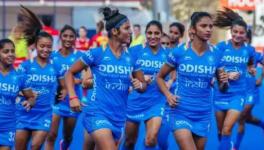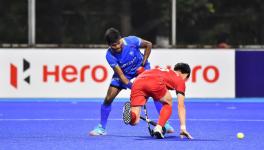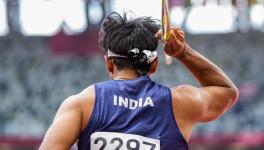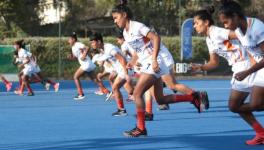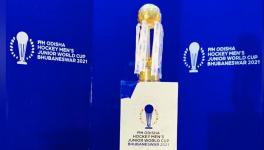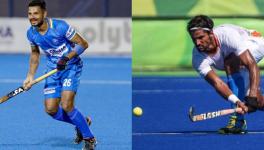India vs Netherlands FIH Hockey World Cup quarters: Rest, as They Say, is Mystery

The Indian hockey team has had four days of rest in the build-up to the FIH Men’s Hockey World Cup quarterfinal against the Netherlands, and coach Harendra Singh will be trying to keep complacency at bay (Pic: FIH).
Ten, nine, eight… two, one…. The matches at the FIH Men’s Hockey World Cup start with a countdown, played loud on the PA speakers with players of both teams appearing one by one, corresponding to a countdown digit, on the two stadium screens. The crowd is urged to join in. They oblige too, loudly, their voices interspaced by claps, whistles and a roar as the referee blows the whistle to get things underway.
For the players, there exist beautifully synchronised warm-up routines to activate their muscles and hockey cognisance, enabling them to hit the turf running, at an insane pace. The countdown, beyond being a crowd activation trick, acts as a necessary warm-up for the spectators to train their collective focus onto the blue turf as the action is blink-and-miss.
I did blink last evening, and miss. Luckly, it was not a goal. Belgium earned their first penalty corner of the crossover match against Pakistan dot at the 30 seconds mark off a well-synchronised move which gave most of its players a first touch. While one followed the ball the first 20 seconds, a momentary glance into the computer screen was all it took for the miss.
Also Read | Golden Freedom: Legacy of Independent India’s First Hockey Olympic Gold in 1948
“A goal, or an attempt at goal, can be achieved in just seven seconds flat, starting from the centre line,” says Siegfried Aikman, Japan’s Dutch coach.
The architect of Japan’s Asian Games coup, a gold ahead of Malaysia, Pakistan and India, adds that mere seconds make a difference, be it late in the match or at the start.
In the most modern iteration of the fast-evolving game of hockey, there is no scope for any form of “inertia of rest” — pardon the tinge of Newtonian physics. And inertia is one of the many variables the Indian hockey team will be keen to negate ahead of the quarterfinal against the Netherlands on December 13.
India head into the match after a four-day rest, and keeping complacency at bay is a priority. The men, under the glaring attention of coach Harendra Singh, went through the paces under the noon sun at Kalinga Stadium on December 11, keeping themselves on the boil, no doubt. The occasion is big.
In fact, the coach believes playing the quarterfinals is tougher than the semis, as the psychological burden of knowing a loss is sudden death adds to the pressure.
Video | FIH Men's Hockey World Cup: For the Fans, By the Fans
India skipper Manpreet Singh concurs. “In the semifinals, if we win, we enter the final and a medal is guaranteed; and if we lose we can always play the bronze medal match,” he says. “In the quarterfinals, if we lose, we end up with nothing.”
Hearing Manpreet address the ‘L’ word, left one with a bit of trepidation. A little earlier in the morning, we had caught up with India’s Olympic gold-winning skipper V Baskaran, who reiterated the need for players to “believe in destiny” and “setting a destination” for the tournament, and then play towards reaching there.
“Only if you have that destination in mind, you will reach there. Otherwise, mentally you are likely to lose the plot,” he said, while sharing the mindset of the men he led to gold at the Moscow Games in 1980. Baskaran led a side which was similar to the current one. There were many young players — who went on to become legends in their own right — while Baskaran the skipper acted as mentor and the point person who would ensure their belief in destiny remained intact.
It is a similar belief, coupled with attention to detail, and a win or bust attitude that helped underdogs Japan to the Asian Games gold in Jakarta, says coach Aikman. “We were there to win gold, and we had that drilled into the mind of the players,” he reveals.
The current Indian team, under Harendra, is no doubt a focused group, and the preparations, tactics, technique, and fitness, are on par with the best sides in the world. But, Manpreet’s words — though in his defense was an attempt at trying to sound diplomatically correct — betrays a ever-so minute chink in the psyche.
Also Read | FIH Hockey World Cup: India and the Double Dutch Dilemma
Experts reiterate that loss should never be an option in the players’ mental fortress, even though victory or defeat are two parts of a coin.
Many in this young Indian side have tasted global success under Harendra at the Junior World Cup two years back. But the same players have endured baggage-making losses too. At the Asian Games, for instance.
Having said that, one would imagine they will surely try and give more than their best against the Dutch. Additionally, the four days of rest has been good for the side to recover from niggles and brace for the physical toll the European champions would demand in the match.
Manpreet, himself, has recovered from a throat infection and is ready to orchestrate India’s forays in the middle, and, promises a high intensity attacking game.
When reminded about the attack-oriented Dutch intent on the turf, the skipper retracted a bit insisting that the attempt would be to break the Dutch control by breaking their game with high presses, and creating attacking opportunities there after.
Of course India can’t afford to sit back and try and weather a Dutch storm, like they did and got away with against Belgium. Billy Bakkar and Co. comes out with a mood and rhythm that invariably take one direction, towards a goal fest. Ask Malaysia, Pakistan or even Canada, who all faced the Dutch brunt through the course of the tournament.
Also Read | FIH Hockey World Cup: India Show Old School Guile and Modern Will in Victory
That makes us wonder whether the four-day luxury might end up being a problem for India rather than a boon. The form in which hockey is played, anything below the boil instantly hands over the momentum to the opponents. The Netherlands, meanwhile, played two matches in the period, and if their coach Maximiliano Caldas is to be believed, his players prefer being out there on the turf, and back-to-back matches only adds to their efficiency, while also helping in fine-tuning various aspects.
Manpreet insists the rest and its impact is the least of India’s worries and one would understand where that comes from. After all, bigger worries are there for them in the form of Jeroen Hertzberger, Thierry Brinkman, Mink van der Weerden, Valentin Verga… The Netherlands have been pretty Dutch about scoring, with their players sharing the responsibility.
India have prolific scorers too: Lalit Upadhyay, Simranjeet Singh and Harmanpreet Singh have been in a good scoring mood, and would be key for them in the match. The rest, depends on how they hit the turf on the day, hopefully with no a mass-inertia equation to solve.
Get the latest reports & analysis with people's perspective on Protests, movements & deep analytical videos, discussions of the current affairs in your Telegram app. Subscribe to NewsClick's Telegram channel & get Real-Time updates on stories, as they get published on our website.










